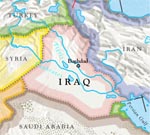Kirkuk - Unable to elect, unwilling to compromise
 Kirkuk, Iraq - Unlike most of the rest of the country, Kirkuk, a province of some 850,000 people, will not be going to the polls on January 31.
Kirkuk, Iraq - Unlike most of the rest of the country, Kirkuk, a province of some 850,000 people, will not be going to the polls on January 31.
The simple reason is that the province, riven by ethnic and political tensions, is not ready for a peaceful and democratic transfer of power.
New US Vice-President Joe Biden, on a visit to the city in January, proclaimed that solving the city's problems would be an important goal of the new US administration under Barack Obama.
Those problems can roughly be expressed in the following equation: Ethnic mix, plus abundant oil, plus a weak democratic culture, equals extreme political tension.
Kirkuk's ethnic mix stems from successive waves of migration to the region since the Ottoman Empire.
The province is now divided between Kurds, who see it as an integral part of the Kurdish homeland and would wish to have it controlled by the Kurds' own regional government, and Arabs, who were moved here as part of a Saddam Hussein effort to "Arabize" the province's oil-resources.
And besides those two main groups, are Turkomans and Christians who fear their lot should either Kurds or Arabs achieve unbridled power.
The oil, of course, raises an ordinarily tense ethnic situation into a murderous one.
Saddam, in the 1991 so-called Anfal ("The spoils of war") campaign, killed 182,000 Kurds in the region, according to the Kurdish count.
Since the US-led invasion of 2003, when tens of thousands of expelled Kurds returned to their former homes, complicating the demographic picture once more, ethnic violence has been a constant feature of life in the region.
In December 2008, a suicide bomb attack on the Abdullah restaurant north of Kirkuk killed some 55 people - including leaders from the provinces' various ethnic groups, who were discussing how to ease the region's ethnic tensions.
"The Kirkuk question already threatens the stability of the country. Conflicts between the central government and the Kurdish parties have risen in recent months," said Guido Steinberg, an Iraq analyst at the Berlin-based Institute for International and Security Affairs.
"Without some political solution, the result might well be violence in Kirkuk and in all the regions bordering on the Kurdish region," he added.
The violence - potential and actual - stems from two seemingly irreconcilable claims, according to observers.
On one side, the dominant Kurdish stance in Kirkuk remains wary of any political event that weakens their claim on the city, a stance hardened into cynicism by the victimization experienced under previous regimes.
"Now the Americans have abandoned us like the British before them. They abandoned the issue of the people of Kurdistan and their demands of including Kirkuk in the region of Kurdistan. We are now facing two options to surrender or to fight to assure our existence," Heyiwa al-Barzangi, 38, a Kurdish merchant, told Deutsche Presse-Agentur dpa.
The fact that Kirkuk's security forces are dominated by Kurdish militia fighters, or Peshmerga, does not make matters easier.
On the other side, resistance to Kurdish claims on Kirkuk is expressed as a desire to avoid the atomization of Iraq, something that has been a constant spectre across the country since the 2003 invasion.
In particular, non-Kurdish elements are pushing for the Saddam-era Arabization to now be seen as legitimate, rather than an aberration that needs to be reversed.
"We have to put an end to the Kurdish exploitations on the Arab and Turkoman soil. We won't achieve any solution with the Kurdish rebellion and disrupting of matters," said Essam al-Biaty, 40, a turkoman lecturer at a Kirkuk teacher-training college.
"What we need is a (UN) Security Council resolution that admits the Arabization of Kirkuk and divides power equally between different factions," he said.
To mediate between the competing claims, a UN panel under Special Representative for Iraq Staffan de Mistura has been set up, comprised of human rights specialists, experts in demographic change and elections.
The committee ought to present a draft election law for Kirkuk's provincial council to the Iraqi parliament before March 2009.
What such a document would contain, however, is still far from clear, in the absence of meaningful political concessions from the province's claimants, thinks Guido Steinberg.
"The UN effort has shown that a compromise between the competing parties is difficult to bring about. The Kurdish desire to control Kirkuk remains too strong for a reasonable compromise solution to emerge," he said. (dpa)